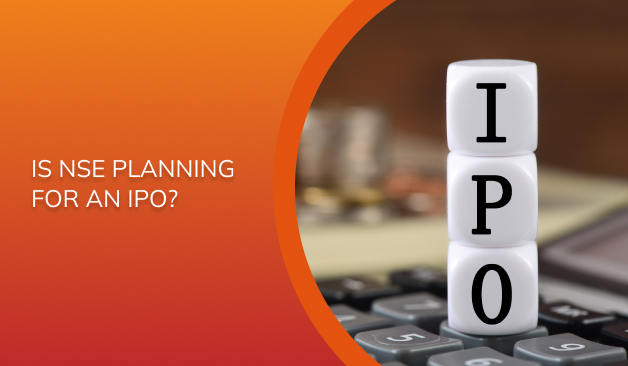
Is NSE planning for an IPO?
The National Stock Exchange (NSE) has been planning its IPO (Initial Public Offering) for quite a while now. In fact, NSE filed its DRHP way back in 2016. Since 2020, the news of NSE's IPO keeps surfacing. However, over the last few years, the company has faced delays due to various regulatory hurdles and other factors.
NSE IPO Details
As we mentioned above, the DRHP was submitted in December 2016, and it won't be fair to assume if NSE comes with its IPO, the numbers and objective of the issue will remain the same.
However, to investors some idea, an IPO was planned as an offer for sale (OFS), meaning existing shareholders will sell their shares to the public. It means the NSE itself won't receive any funds from the IPO. The DRHP mentioned an offer of 11.14 crore shares to the public.
Categories of Investors: The shares will be offered to different categories of investors:
- Qualified Institutional Buyers (QIBs): Maximum 50%
- Non-Institutional Investors (NIIs): Minimum 15%
- Retail Individual Investors (RIIs): Minimum 35%
Why NSE's IPO is getting delayed?
Let us understand why the NSE IPO is taking so long:
- Regulatory Issues: NSE has faced regulatory scrutiny and investigations from SEBI related to issues like co-location facilities and algorithmic trading. These issues have needed to be resolved before SEBI could give final approval for the IPO.
- Co-Location Scandal: The co-location case, which involved allegations of certain brokers getting preferential access to NSE's trading systems, has raised questions about corporate governance. Until these issues are fully resolved, the IPO cannot move forward.
- Market Conditions: Unfavorable market conditions can also lead to delays in IPOs. Companies often wait for more opportune times to launch their public offerings.
Key Investors in NSE
Key domestic investors in NSE represent a mix of institutional giants and prominent individual stakeholders, reflecting the exchange's strategic importance in India's financial ecosystem. Life Insurance Corporation of India (LIC) holds a significant 10.72% stake, showcasing its long-term commitment to NSE's growth.
Stock Holding Corporation of India, primarily focused on custodial and depository services, owns 4.44%, underlining its alignment with NSE's critical role in capital markets. Similarly, SBI Capital Markets, the investment banking arm of the State Bank of India (SBI), holds around 4.4%, with the parent organization, SBI, directly holding an additional 3.23%.
Notably, renowned investor and retail magnate Radhakishan Damani, known for his strategic investments and as the founder of DMart, owns a 1.6% stake, reflecting strong confidence from individual high-net-worth investors. This diverse ownership structure highlights the trust and reliance on NSE from various financial powerhouses and influential market participants.
Will NSE IPO be India's largest IPO?
The NSE recently said it wants to launch its IPO, which could beat Hyundai's record for the largest public issue. NSE does not want an IPO for price discovery of its shares but for the sake of transparency and accountability.
“The IPO will increase transparency and accountability. We are valued at around Rs 4.75 lakh crore in the unlisted market and as India's largest exchange we should be accountable to the market," Sriram Krishnan, Chief Business Development Officer, NSE, told reporters recently.
He said the IPO is not about price discovery as the bourse doesn't have a promoter. "We are a quasi-commercial organization," Krishnan said.
The exchange's current market capitalization is near Rs 4.75 lakh crore, and if NSE decides to offload 10% equity in the IPO, the size of it could be around Rs 47,500 crore — making it the biggest-ever public issue in India.
NSE is awaiting Sebi's nod to file papers. "Whenever the approval comes, we will go for the IPO," the official said.
Financial Performance of NSE
Between 2019 and 2024, NSE showcased exceptional financial growth, with its revenue surging over five times from Rs 3,027.79 crores to Rs 16,433.61 crores and net profits increasing more than fourfold from Rs 1,708.04 crores to Rs 8,305.74 crores. During this period, profit before tax also grew substantially, rising from Rs 2,576.21 crore in FY19 to Rs 11,184.28 crore in FY24.
This impressive growth was achieved with an asset-light business model, and without relying on debt. By FY24, the company’s total assets had expanded to Rs 65,464 crore, up from Rs 19,978 crore in FY19. NSE’s revenue streams are robust and diversified, with 73.8% derived from transaction charges, 5.4% from co-location charges, and 10.79% from other fees, reflecting its strong operational efficiency and strategic focus.
NSE Share Price
As of January, NSE's shares are trading at Rs 1,800 per share in the unlisted market. In November 2024, NSE implemented a significant corporate action by issuing four bonus shares for every share held. It effectively quintupled the total number of shares in circulation, making the shares more affordable for investors and increasing liquidity in the unlisted market.
Before you go
The NSE may come soon, but as of today, the dates are not known. Investors should wait for official announcements from NSE and SEBI for confirmed details regarding the IPO launch.










